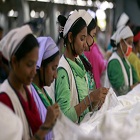"BGMEA’s roadmap gets special importance for achieving a near double-digit export growth in the calendar year, 2015. Global focus is on working conditions in the readymade garment (RMG) factories in Bangladesh. Quite clearly these essential conditions are to be addressed for the 2021 roadmap. Nevertheless, certain enabling conditions are to be addressed even for sustaining the present trend of success in export."

Ranging from infrastructural issues to impact of changes in the global trade regime, the challenges faced by Bangladesh’s RMG sector have many dimensions. On issues beyond infrastructural impediments, a coordinated approach by different stakeholders within the Bangladesh government and private sector requires to start immediately. To increase its annual export of readymade garments to $50 billion by 2021, the Bangladesh Garments Manufacturers and Exporters Association (BGMEA) have chalked out a roadmap. A recent roundtable in Dhaka outlined the conditions to be fulfilled to attain that 'ambitious but possible' goal.

BGMEA’s roadmap gets special importance for achieving a near double-digit export growth in the calendar year, 2015. Global focus is on working conditions in the readymade garment (RMG) factories in Bangladesh. Quite clearly these essential conditions are to be addressed for the 2021 roadmap. Nevertheless, certain enabling conditions are to be addressed even for sustaining the present trend of success in export.
Second sustainability compact review
In January the second review of Sustainability Compact was held in Dhaka. Senior officials of the ministry of commerce, labour and employment and ministry of foreign affairs and senior officials from the European Union (EU), US and International Labour Organisation (ILO), along with representation from the governments of Canada, the Netherlands and UK participated in the meeting. The review meet recognised the need for further improvement in six areas of which four are on the rights of workers and two on inspections and remediation of RMG factories identified with different degrees of fault in their structures. Clearly this finding stressed more on improvement in the legal regime protecting the rights of the workers. With 85 per cent share of total RMG export from Bangladesh (woven and knit with equal share) going to the EU, US and Canada, the Compact mechanism deserves highest importance to plan any ambitious target.
Perils of moving up development ladder
Bangladesh’s exports to the EU will face new challenges as it is graduating from the LDC status. First, Bangladesh will lose unilateral duty-free access and come to be within the general GSP. Secondly, Bangladesh will miss relaxed rules of origin enjoyed as an LDC. For the RMG sector, it means, importers will pay most part of the standard duty when importing from Bangladesh. Again, GSP is given for RMG products, only if the fabric is produced in Bangladesh. Even if Bangladesh applies for GSP+ and starts receiving duty-free access, the rules of origin for general GSP will be applicable; unlike the relaxed rules for the LDCs. Bangladesh will also be required to comply 27 UN/ILO Conventions instead of 15 for the LDCs.
Another immediate challenge before Bangladesh RMG exports is the new GSP administration in export to the EU. Currently, Export Promotion Bureau (EPB) is the only competent authority to issue GSP certificate for RMG factories. From 2017 or 2020, depending on the decision of Bangladesh, all GSP certificates for the EU will be issued by the exporters.
Worries before RMG sector
Bangladesh’s RMG sector is worried that its competitors like India and Vietnam will benefit more with free trade agreement (FTA) with the EU. The Trans-Pacific Partnership (TPP) is also causing apprehension that RMG exports to the USA will be negatively affected. Bangladesh does not enjoy any preferential access under GSP or any other system in the USA for apparel products. But losing out to Vietnam in export to the USA and EU under FTA is unlikely to happen in the short term. The ‘Yarn forward Rules of Origin’ in the TPP will be a major impediment for Vietnam to enjoying duty-free access for its apparel products. It means all products in a garment factory from the yarn stage forward must be made in one of the countries that are party to the TPP agreement.
As a condition to boost exports to reach the envisaged target by 2021, Foreign Direct Investment (FDI) in RMG sector has been identified at the BGMEA Roundtable. However, BGMEA and BKMEA have been lukewarm towards encouraging FDI in the RMG sector. During the Multi-Fiber Arrangement (MFA) trade regime under the World Trade Organisation (WTO), Bangladesh discouraged FDI in RMG sector to prevent its competitors to use the quota enjoyed by Bangladesh.
The sooner Bangladesh takes over its exclusive responsibility in monitoring, coordinating and enforcing the 'National Tripartite Plan of Action on Fire Safety and Structural Integrity in RMG sector', it will be easier to withstand pressure which are perceived now as unfair.












